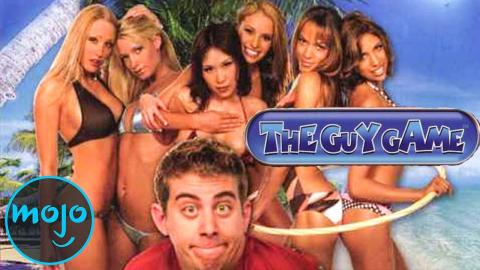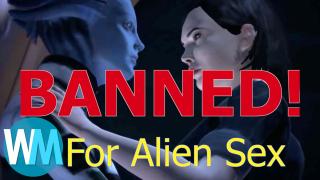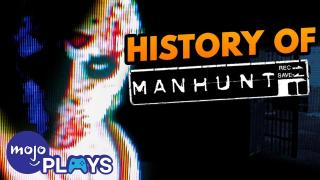Top 10 Video Games Banned in Entire Countries

#10: "EverQuest" (1999)
It might seem rather commonplace nowadays for players to choose whether they want to be a righteous, paragon of good or a bad anti-hero protagonist in their video game journey. But Brazilian fans of Massively Multiplayer Role-Playing Game (MMRPO) “EverQuest,” a game where players go on an… everlasting quest, this feature caused a legal quandary–nine years post-release. In 2008, the 17th Federal Court of Mina Gerais State ruled that “EverQuest” led to players "loss of moral virtue” and took it off the shelves. Basically, because you could choose to be good or bad, it was banned. The Brazilian national ban was lifted, except for in Minas Gerais who maintained their State’s court order.
#9: "Postal 2” (2003)
We know what you’re thinking: how come a game that is based on an innocent mail delivery service be so offensive? Alas, the game, in which you play as a protagonist "going postal," delivers little but rather obscene violence. So, it shouldn’t be surprising that the 2003 sequel–which escalated the violence to nihilistic levels, and carried the tagline "Remember, it's only as violent as you are!" would be anything less than controversial. In fact, there are 13 countries that have banned this game altogether, including New Zealand where it is a fineable offense of $50,000 to own or distribute a copy. Yet, this didn’t deter game makers “Running With Scissors” from taking it further, as “Postal 4: No Regerts” was released in 2019.
#8: "Football Manager 2005" (2004)
We know what you’re thinking: how does a game that is based on an innocent Soccer management structure be so offensive? “FM'05” is definitely the most innocuous game on this list of banned video games–after all, it is essentially a series of lists of countries and independent nations… which is the issue. For classing Tibet and Taiwan as independent countries, The Chinese government released a statement saying that the game "seriously violates Chinese law and has been strongly protested by our nation's gamers'' and took it off the shelves. In China, it is illegal to go against the governmental narrative that they are independent nations whether you regard them as such or not, and so “Football Manager 2005” was sent off.
#7: "The Guy Game" (2004)
Another Top 10 BANNED Video Games
This could potentially be the only game that has been banned in the United States for its actual content, and not because of any particular copyright law impingements. "The Guy Game '' was an awful trivia gameshow-style video game that featured footage of real life models every time you got a question right. But when it came out that one of the models featured was underage at the time of filming (at 17 years) and was unlawfully coerced (by not telling her the content she was filming for) the game was promptly recalled and banned…
#6: "Left 4 Dead 2" (2009)
10 MISTAKES Video Game Developers Intentionally LEFT IN
Valve’s “Left for Dead” sequel has had an interesting life in the Australian and German Markets. Upon its release, the game was banned in Australia as the rating system did not go higher than the MA15+ that the first game was labeled. However, after Valve censored parts of the original game, it was unbanned in 2014 but with a newly minted restricted content rating of R18+. To date, the original uncensored version of “Left 4 Dead 2” has never been available on the Australian market. A similar situation happened in Germany, with a censored edition on the shelves until 2021 when the original version was released after a review.
#5: "Grand Theft Auto" Series (1997-)
The 10 Weirdest Unlockables In Grand Theft Auto Games
As most of Rockstar’s games have been banned somewhere, they could probably have a list of their own. So here is the cliffnotes version: The original 2D game is banned in Brazil, as is the “GTA: IV” expansion pack for using music from Brazilian musician Hamilton da Silva Lourenço without permission. In “GTA: III” was recalled in Australia despite it's MA15+ rating, but after Rockstar modified the game, a censored version was released a year later. Similar censored versions of “GTA” installments were released in Germany prompting their own ban to be lifted in 2012. After a Taxi Driver was killed in what was alleged as a copycat crime, Thailand banned the games (although “GTA:V” is still available for Digital Download.)
#4: "Carmageddon" (1997)
Video game carnage has been considered taboo in some countries since the very first red pixel represented blood. However, even the most tolerant of governmental agencies did take exception to some titles in the earlier days of Video Game Classifications–and that is true of this entry. Banned in Germany completely, “Carmageddon” was removed from the UK market for 10 months, to give developers an opportunity to nullify the game’s violent content. This involved removing all of the “people” from the game and replacing them with zombies or robots–turning their red blood green–so that the players weren’t mowing down humans in game, but the undead.
#3: "Pokémon Trading Card Game" (2000)
How Pokémon Became a Global Phenomenon: Video Games
Pokemon is many things to many people, but did you know that it was supposedly sacrilegious? The video game adaptation of the popular trading card game has been banned from the Saudi Arabia due to it's promotion of "Zionist" views… yep, you heard that correctly. This stems from the believed usage of the Jewish “Star of David” and other religious imagery, inserted in the game and on the cards. They have also banned subsequent games in the series for its promotion of gambling and evolution. The ban is slowly being lifted on the rest of the franchise, but has yet to be moved on the original Game Boy releases.
#2 : "Bully" (2006)
Contain your shock! Another Rockstar Game was banned! Except this time, it was only one country that did so: Brazil, and even then “Bully” wasn’t off the shelves forever. The ban was based on findings from the state's psychology society that believed the game would be harmful to young people. However, in 2016, the decision was reversed. Interestingly, there were calls for the British Board of Film Classification (BBFC) to ban, or at least reclassify the game's initial 15 rating in the UK. In Florida, Activist and former Attorney Jack Thompson claimed it was a "Columbine simulator" but his attempts to ban were overruled by a judge order. Thompson was eventually disbarred after his numerous attempts to get families to sue Rockstar Games.
#1: "Manhunt 2" (2007)
Manhunt: Retrospective | MojoPlays
What a surprise, the final boss of this list would be Rockstar. “Manhunt” was a pretty controversial game upon its release in 2003. It’s successor certainly lived up to that level of infamy, spurred on by the game’s unrelenting displays of violence. In the UK, the BBFC refused to classify “Manhunt 2” and were even pressured to re-classify the edited version as well. Somewhat ironic, given that the game was made by Rockstar’s British offices. The game is completely banned in Germany, Malaysia, New Zealand and South Korea. It was never released in Australia thanks to a similar non-submission to the Australian Classification Board and banned in Ireland in a then-unprecedented decision by the Irish Film Censor's Office.





